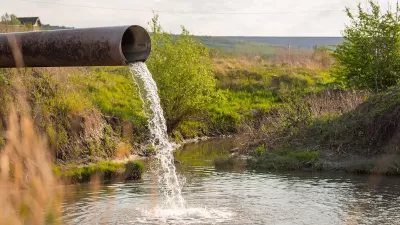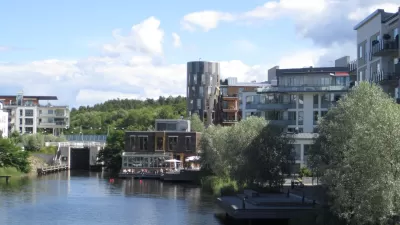Three decades after it was established, the EPA's Superfund program is taking on some of the most complex and costly projects ever attempted. With many focused underwater, some worry the stirring up of polluted sediment will exacerbate the problem.
After decades, and centuries in some places, of acting as a toxic dumping ground, America's rivers and riverfronts have been the targets of cleanup efforts by the federal government's Superfund program. But as the EPA tackles some of the most "complex cleanups ever attempted," located in "large stretches of urban waterways where the pollution is out of sight," doubts remain about the best method to handle such immense efforts, reports Anthony DePalma.
DePalma's article chronicles accounts of well-intentioned cleanup efforts gone wrong. And although many do, in fact, improve the safety of targeted sites, they can stir up waste in the process, threatening the surrounding ecosystem. Still, the federal government is pushing ahead with the Superfund program, utilizing new cleanup technologies and computer modeling.
FULL STORY: Superfund Cleanup Stirs Troubled Waters

Planetizen Federal Action Tracker
A weekly monitor of how Trump’s orders and actions are impacting planners and planning in America.

Maui's Vacation Rental Debate Turns Ugly
Verbal attacks, misinformation campaigns and fistfights plague a high-stakes debate to convert thousands of vacation rentals into long-term housing.

Restaurant Patios Were a Pandemic Win — Why Were They so Hard to Keep?
Social distancing requirements and changes in travel patterns prompted cities to pilot new uses for street and sidewalk space. Then it got complicated.

Charlottesville Temporarily Has No Zoning Code
A judge ordered the Virginia city to throw out its newly revised zoning code, leaving permitting for new development in legal limbo.

In California Battle of Housing vs. Environment, Housing Just Won
A new state law significantly limits the power of CEQA, an environmental review law that served as a powerful tool for blocking new development.

Boulder Eliminates Parking Minimums Citywide
Officials estimate the cost of building a single underground parking space at up to $100,000.
Urban Design for Planners 1: Software Tools
This six-course series explores essential urban design concepts using open source software and equips planners with the tools they need to participate fully in the urban design process.
Planning for Universal Design
Learn the tools for implementing Universal Design in planning regulations.
Heyer Gruel & Associates PA
JM Goldson LLC
Custer County Colorado
City of Camden Redevelopment Agency
City of Astoria
Transportation Research & Education Center (TREC) at Portland State University
Jefferson Parish Government
Camden Redevelopment Agency
City of Claremont





























